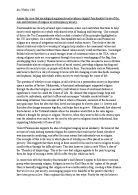The ‘New Right’ on the other hand was a huge reform and came by storm emerging in the 70s throughout the power of Margret Thatcher in the 1980s. This reform was a political philosophy and political movement which was critical of the current education. The origins of the New Right reflect a general dissatisfaction with the state of education and pointed out the poor quality and irrelevance to the needs of the economy. Continuous assessment was introduced to test the National Curriculum. This contrasts to the perspectives of functionalists as the difference of opinion of that the system should be praised and feedback should be positive, whilst the New Right wants to re-shape education and are desperate in needing to provide young people more ready for the work environment. This wakeup call then introduced ‘New Vocationalism’, This was where social perspectives of equality of opportunity need to improve educational standards so that it can produce a better qualified workforce in order to create more wealth. For example diploma and BTEC levels were established. The New Right have left a legacy which continues to reform the education system and even though functionalists have different approaches to the system the purpose of the New Right reform is to benefit every individual of society.
Another critic of the functionalist perspective is Marxists. Marxists suggest that like functionalists they see the school as preparing the young for adult society that they will face in the future. However unlike functionalists they do not see this as a positive thing but as a way of manipulating the minds of the younger generation. This ‘conflict’ theory took over popularity and went up to challenge functionalists. This perspective has the point of view that groups exist in society that have different interests and that some groups benefit from certain positions that they hold in society. Marxists can see change benefiting education but then say such changes must be accompanied by wider social changes.
Like Marxists, Bowles and Gintis (1976) see work as exploitive and alienating. They believed that meritocracy was a myth and therefore introduced the ‘correspondence theory’ which promotes the values expected of individuals in each social class and to prepare students for the types of jobs typically held by members of their class. They suggested that school mirrors the world of work to create a compliant work place. The hidden curriculum also being mentioned in fuctionalism however being conflict is seen as negative. This is because it is believed that it exemplifies the Marxists view that education transmits unstated ideological messages to young people. For example the production of obedient workers who can be easily manipulated by the employers just how pupils must obey the school rules so that they are ready to obey the rules of their workplace.
Another belief of Marxist about education is that they claim school perpetuates a ruling class ideology, based on promoting competition and the acceptance of inequality as legitimate.
Feminists claim that society is organised around the interests of men and women are reduced to subornate roles in comparison those positions held by men. This strong view of Feminists reflect different theories of those of a functionalist and a Marxist. One reason this is because the ideologies are suggesting separate problems, which being for Feminists the main problem is inequality. Functionalism suggests that the education system is successful and Marxism suggests that it is not, whilst Feminists believe empathises that school and wide society are patriarchtical in character. They make links that formal and the hidden curriculum favoured boys including the concept of malestream where male teachers dominate subjects thought as ‘male subjects’. This can be perceived as a patriarchy society and is male dominated economically, politically and socially. However in the last 30 years Feminists have successfully raised the status of girls in education and are closing the gap of inequality, where all social groups can be treated equal. Functionalists on the other hand do not address the possibility that inequality may be socially created and education is a former carrier of inequality.
The Liberal/ de-schooling approach education as the promotion of the well being of the individual rather than aimed at improving society as a whole. These contrast with the beliefs of functionalists as they each suggest different roles of education. Ivan Iillich claims that school crushes a child’s spirit by removing their sense of identity and free thinking and school produces unthinking automatons. In contrast to functionalists that think education benefits the society, whilst as said, liberals stress the need for education to teach people to think independently and focus on the well-being of individuals as suggesting it should be freedom from having to conform to the demands of any group.
There is a clear difference of sociological opinion over the role of education being consensus and conflict perspectives. Functionalists same similar values to certain aspects of the other views, however strongly feel that the roles of education all combine to see society as a system of interdependent parts held together by a shared value system.









